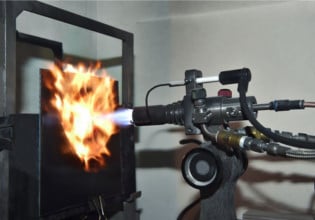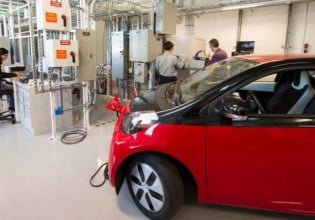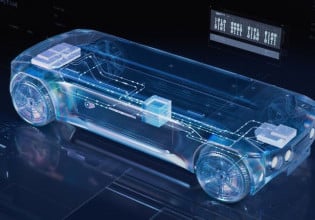More Power to the Electric Drivetrain
This article introduces and discusses Danfoss' power module technology platform, DCM™1000, for automotive traction applications.
To power up the fast-growing fleet of xEVs, Danfoss Silicon Power has developed a power module technology platform, DCM™1000, for automotive traction applications. It addresses and solves critical issues to enhance the energy efficiency and performance of the electric drivetrain, while achieving high cost-efficiency.
Governmental policies around the world are increasingly focusing on reducing our global CO2 footprint. As a result, tier 1s and OEMs in the automotive industry are incentivized to optimize their electric drivetrain technology to supply the growing demand for attractive and affordable electric and hybrid electric models. This calls for smart power solutions that increase performance of the powertrain while decreasing costs: A tough challenge that needs to be met if EVs are to become the most attractive option for the consumer.
Making most out of the power semiconductors
The performance of the electric drivetrain rests on the inverter’s ability to transfer energy from the battery to the motor. Better battery power utilization and thereby higher efficiency can contribute to increasing the driving range of the electric vehicle, which in turn is a key issue for consumers considering moving over to an EV. The traction inverter is power module based using silicon or silicon carbide as semiconductor material. To enable better drivetrain performance, the power module must deliver higher power density. With semiconductor content dominating the overall cost of a power module, it is in the economic interests of developers to be able to achieve the highest effect with the smallest semiconductor area. Also, as car manufacturers are looking to optimize their motor design and speed up their time-to-market, compactness and easy integration are critical factors to be dealt with.
Figure 1: DCM™ 1000 power module with transparent molding showcasing Danfoss Bond Buffer®.
To meet the industry demand for power solutions that deliver higher power density, easy integration and cost-effectiveness, Danfoss Silicon Power has launched a technology platform for traction applications in hybrid electric and battery electric vehicles. For decades, Danfoss has enabled the world’s leading automotive manufacturers to deliver solutions that are designed to meet stringent efficiency, reliability and cost targets and ultimately lowering the overall cost of the system. Danfoss Silicon Power is today one of the world’s largest suppliers of power modules to the automotive industry, and the DCM™ 1000 platform is the result of decade long research and development efforts in material science, bonding and joining technology, and thermal management of the electrical components.
Based on a modular approach, the DCM™ 1000 platform enables the customized design of power modules for traction applications - alleviating the need to start development from scratch on every project. It also allows manufacturers to combine modules to scale power and tailor a power solution that matches their ambitions for motor performance.
Patented technology for unique performance capacity
The platform is based on a string of patented technologies, which combine to enable the power module to fully exploit the capacity of the semiconductor. This then makes it possible to achieve higher power density, while reducing the amount of silicon or silicon carbide used. The technologies developed by Danfoss Silicon Power include special copper-based bonding and joining techniques (Danfoss Bond Buffer®), smart thermal management with direct liquid cooling (ShowerPower®) and the solid packaging of the module with transfer molding. In combination, these technologies increase the current carrying capabilities of the module, while ensuring thermal and mechanical robustness. The result? A more reliable inverter with a longer lifetime that fulfils the EV market’s demand for higher output power at lower cost and that is capable to serve a full range of current and voltage requirements in order to leverage economic scale effects.
Figure 2: DCM™ 1000 module showcasing ShowerPower® 3D cooling technology
Figure 3: DCM™ 1000 module in transfer molding package
We are independent
One of the main advantages of working together with Danfoss is chip independency. Being a chip independent power module manufacturer, Danfoss can select between a wide range of suppliers and offerings of suitable IGBTs, diodes and MOSFETs. Naturally, the chip independency extends to the DCM™ 1000 technology platform where semiconductors from various semiconductor manufacturers may be used being Si or SiC semiconductor setups. This enables Danfoss to provide the best suitable semiconductors while ensuring an optimized cost and supply security for our customers through multiple sources on chip level. Through proven cooperation with several major semiconductor suppliers, Danfoss has ensured supply security and optimized topologies for the customers throughout the past decades.
No performance compromises
To reach a series-qualified and reliable power module platform, the DCM™ platform has been thoroughly tested to validate design calculations, to prove output current performance as well as thermal behavior during system/inverter operation, but also to investigate switching and conduction losses. Results have proven the targeted output performance is achieved, allowing automotive drivetrain applications to fully utilize the power semiconductors without derating. DBB® technology ensures that the power cycling will not be critical to the bonding and joining technology inside the module and that the module will remain intact over the full lifetime of a vehicle [1].
Danfoss has also introduced an application kit, offering customers an easy path to start testing and verification of drive train designs utilizing the DCM™ technology platform. Supporting material such as application notes is also available. Danfoss’ application experts will be present at APEC to showcase the power module technology platform along with the application kit for further introductions.
Figure 4: DCM™ 1000 Application kit.
About the Authors
Martin Kristensen is a strategic marketing consultant at Danfoss Silicon Power. He holds a B.Sc in international business and an MSc in economics and business administration from University of Southern Denmark.
Ole Mühlfeld worked as the Application Engineer - Automotive at Danfoss Silicon Power since January 2012. He was promoted and now works as the Director of Application Engineering. He is particularly skilled in the field of power electronics, renewables and automotives. He graduated with his degree in physics from Christian-Albrechts-Univerität zu Kiel in 2007 and stayed on as research staff until 2011.
This article originally appeared in the Bodo’s Power Systems magazine.






